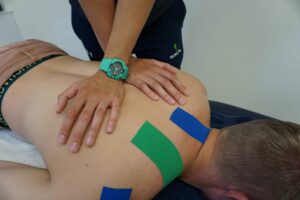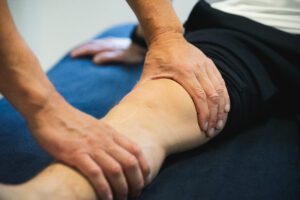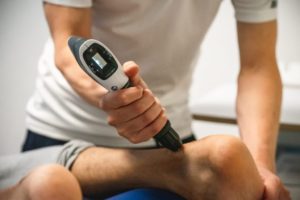What is shockwave therapy?
Shockwave therapy is a treatment technique in which the patient is exposed to powerful 'shock waves'. These can be aimed very accurately at the right place on the body with a treatment head. Shockwaves stimulate metabolism, improve blood circulation and activate the body's self-healing capacity. This accelerates the healing process.
Within physiotherapy, this treatment technique is mainly used in the treatment of musculoskeletal complaints. Consider tennis elbow, inflammation of the Achilles tendon, spasticity and heel spurs.
Why shockwave therapy?
Shockwave therapy can provide a solution for the following complaints:
- Tendonitis
- Heel pain (heel spur), pain under the foot
- Chronic neck, shoulder or back pain and tension (trigger points)
- Chronic shoulder complaints, with or without calcium deposits
- Chronic elbow pain (tennis or golfer's elbow)
- Spasticity
- Pain just below the kneecap
- Chronic Achilles tendon pain (achillodynia)
- Peyronie's disease
- Chronic Pelvic
- Pain Syndrome (CPPS)
- Other forms of tendinopathies
Is your complaint not listed and would you like to know whether shockwave therapy is suitable? Contact us!
Radial and focused shockwave therapy
There are two forms of shockwave therapy: radial and focused shockwave therapy. Radial uses a low to medium energy level, which is distributed over a larger surface area. Radial shockwaves are very suitable for the treatment of tendonitis, spasticity and trigger points.
Focused shockwave therapy uses a high level of energy at a specific concentrated point in the body. This is necessary for conditions that do not respond enough to radial shockwaves, such as CPPS and treatments around the hip.
Shockwave therapy heel spurs
Heel spurs are one of the best-known injuries that can be treated with shockwave therapy. Radial shockwave therapy is used for heel spurs. Not only the heel, but also the surrounding tissue and especially the tendon plate under the sole of the foot are treated. The idea is to inhibit inflammation by stimulating the tissue and trigger a recovery response.
If shockwave therapy is successful, no more than 4 to 6 treatments are often required. If there is no improvement after 10 treatments, in most cases there is no point in continuing the therapy.
Disadvantages of shockwave therapy
The disadvantages of shockwave therapy are very limited. In particular, it takes some time to get used to the impact of the sound waves, which is accompanied by a loud tapping sound. However, most patients do not experience the treatment as painful. The intensity of the treatment can also be adjusted. We usually start low and increase the intensity once the sensitivity has subsided. The treated area may become slightly red or swollen, but this will subside shortly after the treatment.
Benefits of shockwave therapy
At Physiotherapy Iburg we dare to say that our practices in Rotterdam the best Shockwave Therapy to carry out. Below are some important benefits of our shockwave therapy:
- Short treatment of about 5 to 10 minutes per session.
- Not treating the symptoms, but tackling the cause.
- Often a strong improvement is noticeable after an average of 4 to 6 treatments.
- Pain reduction and recovery of mobility after a few days.
- Virtually no adverse effects or risk of side effects.
- Thanks to shockwave therapy, further treatment or even surgery can be prevented.
Is shockwave therapy reimbursed?
Physiotherapy Iburg has an agreement with almost all health insurers. Physiotherapy is reimbursed from the supplementary insurance. Treatments will only be reimbursed by basic insurance if you have a condition that is on the chronic condition list. The number of treatments to be reimbursed by the insurance depends on your policy conditions.
The insured shockwave treatments are declared directly to your health insurer. You will be charged for treatments that are not eligible for reimbursement.
Make an appointment for shockwave therapy in Rotterdam
Are you curious whether shockwave therapy can help with your complaints, or would you like to? make an appointment? Take immediately Contact on!






